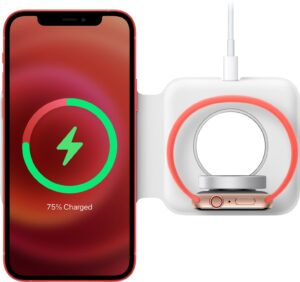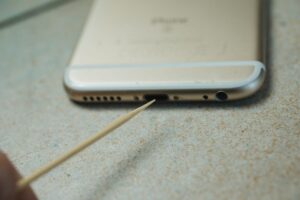Looking for the optimum charging solution for your iPhone? Wondering how many amps an iPhone charger should have? You’ve come to the right place! The amps, or amperage, of an iPhone charger plays a crucial role in ensuring efficient and speedy charging. It determines the rate at which your device will charge, and using the correct amperage can make all the difference in keeping your iPhone juiced up in no time. So, let’s dive in and explore the world of iPhone chargers and amperage to ensure your device never runs out of battery when you need it the most.
How Many Amps Does an iPhone Charger Have?
When it comes to charging your iPhone, one of the most common questions is: “How many amps does an iPhone charger have?” Understanding the amperage of your iPhone charger is important because it directly impacts the charging speed and compatibility with different devices. In this article, we will explore the details of iPhone charger amperage, including its variations, benefits, and considerations.
1. iPhone Charger Amps Explained
The ampere (amp) is a unit of electric current, measuring the rate at which electric charge flows. In the case of iPhone chargers, the amperage refers to the amount of current (in amps) that the charger can deliver to your device while charging. Typically, an iPhone charger has a fixed amperage rating that determines its charging capabilities.
2. Standard iPhone Charger Amperage
The standard iPhone charger, commonly known as the Apple 5W USB Power Adapter, has an amperage rating of 1 amp (A). This charger is included with most iPhones and provides a reliable and moderate charging speed. It is capable of charging your iPhone efficiently but may take longer than higher amperage chargers to fully charge your device.
3. Higher Amperage iPhone Chargers
While the standard 5W iPhone charger is suitable for most users, there are higher amperage options available that can charge your iPhone faster. Apple also offers a 12W USB Power Adapter, which has an amperage rating of 2.4 amps. This charger is compatible with most iPhones and iPads and can provide faster charging speeds compared to the 5W charger.
Additionally, some third-party manufacturers produce even higher amperage chargers, such as 18W or 20W, which are specifically designed for fast charging. These chargers leverage advanced charging technologies to deliver higher currents, allowing you to charge your iPhone rapidly.
4. Benefits of Higher Amperage Chargers
Using a higher amperage charger can offer several benefits, depending on your charging needs:
- Faster Charging: Higher amperage chargers can charge your iPhone at a significantly faster rate compared to standard chargers. This is especially useful when you’re in a hurry and need to quickly charge your device.
- Compatibility with Other Devices: Higher amperage chargers are typically compatible with a wider range of devices, including iPads and certain MacBooks. This means you can use the same charger to power up multiple devices.
- Future-Proofing: Investing in a higher amperage charger ensures that you’ll be ready for future iPhone models that may support faster charging technologies. It offers more flexibility and convenience as technology advances.
5. Factors to Consider
Before choosing a higher amperage charger for your iPhone, there are some factors to consider:
- Device Compatibility: Ensure that the charger you select is compatible with your specific iPhone model. While most chargers work with a wide range of devices, it’s essential to double-check for compatibility.
- Certifications and Safety: Look for chargers that are certified by reputable organizations, such as Apple’s MFi (Made for iPhone) program. These certifications indicate that the charger meets strict safety and performance standards.
- Portability and Convenience: Consider the size, weight, and portability of the charger if you frequently travel or need to charge your iPhone on the go. Compact and lightweight chargers are more convenient for mobile usage.
- Price: Higher amperage chargers generally come at a higher price point compared to standard chargers. Evaluate your charging needs and budget to determine the best option for you.
6. Charging Speeds with Different Amps
The charging speed of your iPhone can vary based on the amperage of the charger you use and the model of your iPhone. Here’s a general overview of the charging speeds you can expect:
- 5W Charger (1A): The standard 5W charger can fully charge an iPhone in approximately 2-3 hours, depending on the iPhone model.
- 12W Charger (2.4A): The 12W charger can provide faster charging times compared to the 5W charger, reducing the charging time to around 1.5-2 hours.
- Third-Party Fast Chargers: Higher amperage chargers, such as 18W or 20W, can charge your iPhone even faster. Depending on the specific charger and iPhone model, these fast chargers can fully charge your device in under an hour.
7. Conclusion
Understanding the amperage of your iPhone charger is crucial for efficient charging. The standard iPhone charger has an amperage rating of 1A, while higher amperage chargers like the 12W or third-party fast chargers offer faster charging speeds. Choosing the right charger for your needs depends on factors like compatibility, safety, and convenience. With the right amperage charger, you can ensure that your iPhone remains charged and ready for whatever comes your way.
How many amps does an iPhone consume during charging
Frequently Asked Questions
Question: What is the amperage of an iPhone charger?
Answer: The amperage of a standard iPhone charger is 1 amp or 5 watts.
Question: Can I use a higher amperage charger for my iPhone?
Answer: Yes, you can use a higher amperage charger for your iPhone. Apple recommends using a 2.4 amp or 12-watt charger for faster charging, as newer iPhones support faster charging speeds.
Question: What happens if I use a lower amperage charger for my iPhone?
Answer: If you use a lower amperage charger for your iPhone, it will still charge, but at a slower rate. For example, if you use a 0.5 amp charger, it will take longer to fully charge your iPhone compared to using a higher amperage charger.
Question: Can I use an iPad charger for my iPhone?
Answer: Yes, you can use an iPad charger for your iPhone. iPad chargers typically have a higher amperage (2.4 amps or 12 watts) compared to iPhone chargers, which allows for faster charging. However, using an iPad charger won’t damage your iPhone.
Question: Can I charge my iPhone with a USB port on my computer?
Answer: Yes, you can charge your iPhone using a USB port on your computer. However, the charging speed will be slower compared to using a wall charger, as most USB ports deliver a lower amperage (typically 0.5 amps to 1 amp) compared to dedicated chargers.
Question: Is it safe to use a third-party charger for my iPhone?
Answer: While it’s generally safe to use third-party chargers for your iPhone, it’s important to choose a reputable brand that meets safety standards. Poor quality or counterfeit chargers may not provide the advertised amperage or voltage, potentially causing damage to your device or posing a safety risk. It’s recommended to use chargers that are MFi (Made for iPhone) certified.
Final Thoughts
The amperage of an iPhone charger is an important consideration when it comes to charging your device efficiently and safely. The standard iPhone charger typically has a current rating of 1 amp or 5 watts, which is suitable for most iPhone models. However, newer iPhone models, such as the iPhone 8 and later, support fast charging and can benefit from a charger with a higher amperage, such as 2.4 amps or 12 watts. It is crucial to use a charger that matches the amperage requirements of your iPhone to ensure optimal charging performance and avoid potential issues. Overall, understanding how many amps your iPhone charger has is essential for a seamless charging experience.



